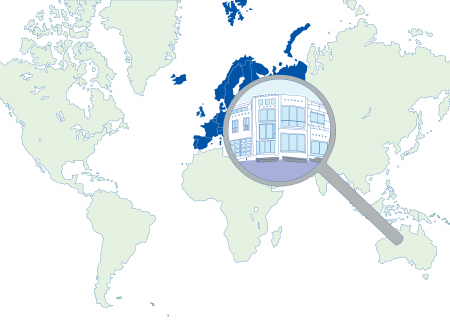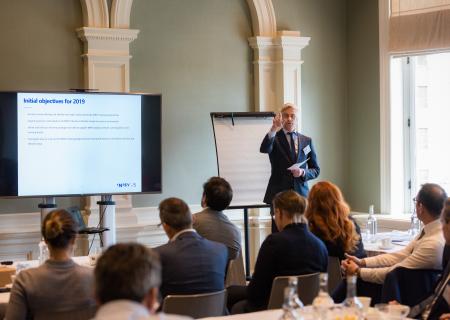The maturing role of the multi-manager
Member Profile: Catriona Allen
IQ recently spoke to Catriona Allen, Senior Fund Manager for LaSalle Global Partner Solutions (GPS). We discussed the changing role of the multi-manager business and her long-running involvement with INREV, most recently as a member of the Investor Advisory Council and the Management Board, where she brings a wealth of experience of investing in indirect real estate globally for institutional investors. She has been working in the multi-manager area of real estate investment since 2005, having previously worked at Aviva Investors and BlackRock.
Allen moved to LaSalle in November 2018 when they acquired the Aviva Investors real estate multi-manager business. ‘LaSalle GPS’ clients are predominantly pension funds,’ she explains, ‘and our multi-manager approach means we can cater to a range of investors – both large and small – with different requirements, via separate accounts and via comingled products. The multi-manager model is evolving, most notably by expanding its reach to access a wider range of global real estate asset-types for our investors; this will be, for example, into joint ventures and co-investments as well as the more traditional fund investments. We are using equity debt, unlisted and listed real estate, and property derivatives too to provide attractive returns through various cycles for our investors over the long-term.'
While the LaSalle GPS team of 36 based in London, Singapore, New York and Chicago is responsible for just under €8billion of assets under management and around 50 clients, Allen herself manages two open-ended funds of funds and three separate accounts. ‘We have seen investors’ appetite for the multi-manager approach continue to grow.’ she says. ‘This is very much a reflection of rising real estate allocations, both among those without any previous exposure and those wanting to expand and diversify their property portfolios, particularly outside their domestic market. Multi- managers can provide a one-stop solution for investing in a broad spectrum of real estate and managing that exposure on an ongoing basis.’
‘Given their breadth of scope, multi-managers are able to take a dynamic approach to investment in terms of the regions where their global portfolios are invested and also to the types of property held in the underlying vehicles. In our case, we not only target the traditional commercial real estate sectors but also have a growing focus on ‘alternative’ property types including senior housing, healthcare, student accommodation, leisure and residential. This reflects research views on how the demand for space is likely to change going forward, particularly with the potential impact of technology on the traditional commercial sectors and evolving demographic trends. Given that there are often few operators active in these new sectors, we are in a position to make them accessible to a wider swathe of investors than would otherwise be possible.'
We have seen investors' appetite for the multi-manager approach continue to grow
‘Urbanisation and ESG are two other themes that we think will be particularly important for our investment strategies in the future,’ continues Allen. By urbanisation, we really mean the return of populations to city centres, both to work and to live - those cities with the highest quality human capital are also likely to be the strongest economically. And from an environment perspective, we require all of the managers we invest with to complete the GRESB questionnaire, so that we can assess the current and future ESG risks at property, fund and manager level. Engaging with managers to foster year on year improvements has always been our focus, rather than the absolute GRESB score. Some funds will underperform due to the sector in which they invest or because they are new entrants to the survey, rather than them having poor ESG credentials per se.'
Allen is keen to stress that LaSalle GPS are focused on working collaboratively with the funds in which they invest, not just in the ESG area but right across the investment process. ‘Looking back 20 years, when the multi-manager business was still in its infancy, some managers were reluctant to take capital from such sources in the belief that multi-managers would alter investment allocations frequently and even withdraw capital from open-ended funds. But now greater collaboration with managers means that the multi- manager offer is more attractive to the underlying managers, as well as to the investor universe. This reflects a greater degree of maturity across the industry as a whole, something to which INREV has also made a big contribution.'
Greater collaboration with managers means that the multi-manager offer is now more attractive to underlying managers, as well as to the investor universe
Allen is well placed to assess INREV’s impact, having been active in the organisation since its foundation in 2003, initially helping develop the fund indices as a member of the Performance Measurement Committee. ‘Benchmarking is in my blood,’ she enthuses, ‘and it’s still very much part of my work today, as I’m dealing with large quantities of raw data for underwriting investments, portfolio analysis and reporting to our clients. In this area the INREV Standard Data Delivery Sheet is particularly helpful, as many of our underlying funds use it. We then leverage the Vehicles Database and Index Analysis Tool for comparing them – and ourselves – to the wider market. The transparency and governance of individual vehicles is an important differentiator when we are deciding which of them to invest in, although the overall standard has improved significantly since the GFC.’
‘Another INREV innovation that we find particularly helpful is the Total Expense Ratio analysis. There is a lot of scrutiny of multi-manager fees because investors have two layers to cover. This means that we need to take care that both our own fees and those of the vehicles we invest in are competitive.’
'This is all part of INREV's role to protect and enhance investors' interests.' she concludes. 'This role is also uppermost in my mind as a participant in the Investor Advisory Council, which I joined in 2015. LaSalle GPS are very supportive of INREV and are represented on other Committees as well. Like the rest of the non-listed industry, I’m keen to see ever more rapid advances in the areas of alignment, governance and transparency that INREV has already helped to take so far.’









